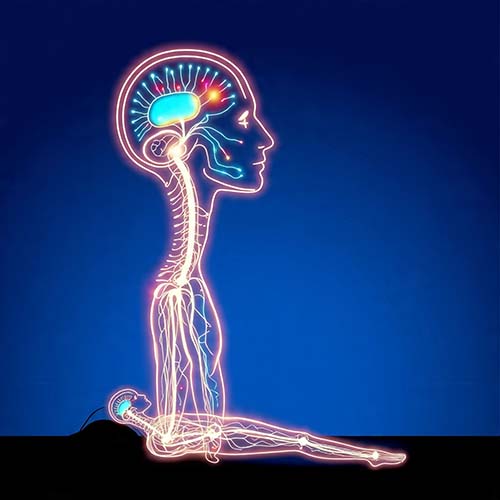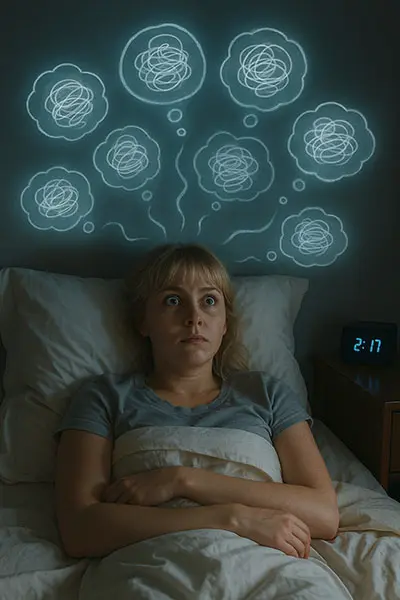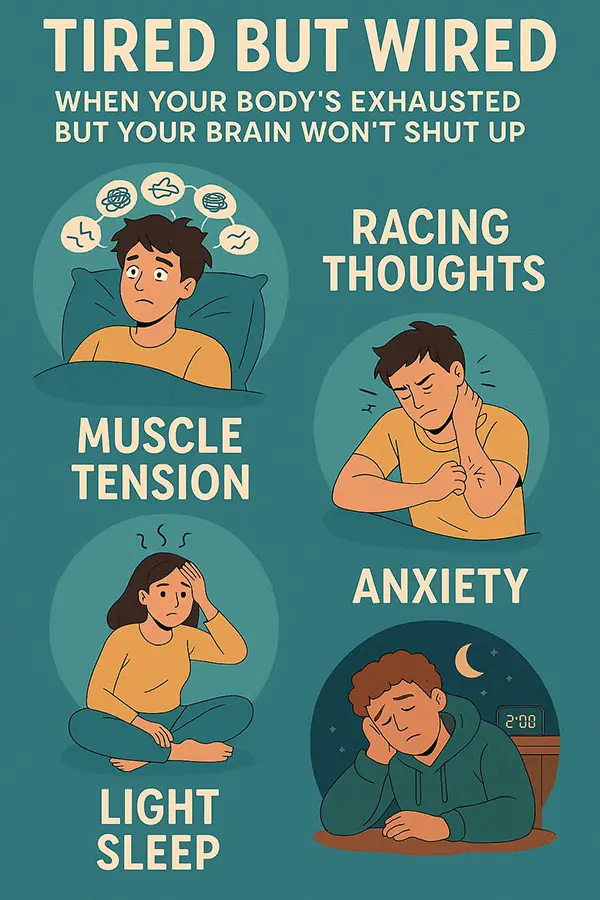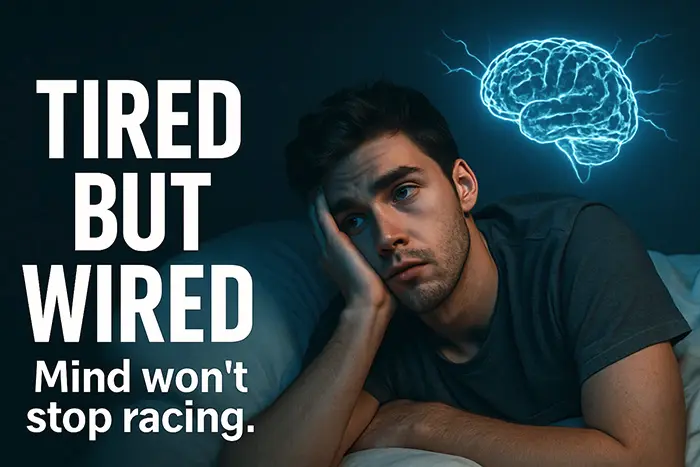It’s 11 PM, and I’m sprawled out in bed, my body begging for sleep. My legs feel like they ran a marathon, my eyes are heavy, but my brain? Oh, it’s hosting a full-on talk show. “Did I forget to reply to that email?” “What if I bomb that presentation tomorrow?” “Should I just quit and move to a beach somewhere?” One thought spirals into ten, and suddenly it’s 2 AM, and I’m still staring at the ceiling, wide awake. Sound familiar? 😴 Ever felt tired but wired? Like your body is crashing but your brain refuses to slow down?
This is the “tired but wired” paradox when your body’s screaming for rest, but your brain’s like, “Nah, let’s overthink everything!” It’s super common, especially for folks in their 20s to 40s juggling work, relationships, and the chaos of adulting. In this article, we’re gonna unpack why this happens, how it messes with your sleep and health, and some real, practical ways to get your brain to chill so you can finally catch some zzz’s. No fluff, just stuff that works, backed by science and a bit of my own trial-and-error. Ready to tell your brain to shut up? Let’s dive in.

You’re physically tired, but your brain keeps racing. Welcome to the “tired but wired” paradox. In this article, we unpack the science and emotion behind it and how to help your body and brain finally sync.
What’s the Tired but Wired Paradox?
Ever feel like your body’s ready to crash, but your brain’s still running a sprint? That’s the “tired but wired” paradox. It’s when you’re physically exhausted maybe from a long day at work or chasing deadlines but your mind’s buzzing like a neon sign. You’re yawning, your limbs are heavy, but your thoughts are racing faster than a TikTok algorithm.
This happens because your brain and body aren’t always on the same page. While your body’s ready to shut down, your brain might be stuck in overdrive, processing stress, worries, or even just random thoughts. According to Healthline, this can be due to mental fatigue, where prolonged cognitive activity keeps your brain alert even when your body’s begging for rest. It’s like your brain’s got its own coffee machine, and it’s brewing a double espresso at midnight. 😅
The Night My Body Said “Sleep” and My Brain Said “Let’s Overthink Everything”
You ever feel like your limbs are made of cement, but your thoughts are sprinting like it’s the Olympics?
That was me last Thursday. I was exhausted. Could barely hold my phone. But my brain? It had other plans.
“What if you forgot to reply to that message?”
“Did you sound weird at lunch?”
“Maybe your whole life needs a reboot.”
I didn’t fall asleep. I passed out from frustration.

Why Does My Brain Stay On When I’m Exhausted?
So, why does your brain refuse to power down? There’s a mix of science and lifestyle stuff at play here:
- Stress Hormones: When you’re stressed or anxious, your body pumps out cortisol and adrenaline, hormones that keep you alert. Even if you’re physically tired, these can make your brain feel like it’s on a hamster wheel. Calm says high cortisol at night can disrupt your natural sleep rhythm, keeping you wired.
- Overthinking and Rumination: Your brain loves to replay the day’s events or worry about tomorrow when it’s quiet. That’s your default mode network kicking in, which gets active when you’re not focused on a task, per The Scientist.
- Screen Time: Scrolling through your phone before bed? The blue light messes with melatonin, the sleep hormone, delaying sleep by up to 30 minutes, according to the Sleep Foundation. Plus, those work emails or viral videos keep your brain engaged.
- Lifestyle Factors: Too much caffeine, irregular sleep schedules, or not enough downtime can keep your mind buzzing. I used to chug coffee at 4 PM, then wonder why I was up till 2 AM.
- Mental Health: Anxiety, depression, or even ADHD can make your brain extra chatty at night. More on that later.
I remember one night after a crazy work day, I was so tired I could barely keep my eyes open. But the second I hit the pillow, my brain was like, “Let’s analyze that awkward meeting from three weeks ago!” It’s like my mind decided bedtime was the perfect time for a deep dive into my insecurities

What’s Really Going On?
This “tired but wired” feeling is a nervous system mismatch. Your body is exhausted. But your sympathetic nervous system (the fight-or-flight one) hasn’t powered down. It’s like trying to sleep with an alarm blaring.
The cause? Could be anything:
– Caffeine too late in the day
– Emotional stress that didn’t get processed
– Blue light before bed
– Late-night overthinking loops
– Or just living in a world that never shuts up
Is My Busy Mind ADHD?
You might be wondering, “Is my brain always this loud because I have ADHD?” It’s a fair question, especially since overthinking can be a symptom of ADHD. But hold up it’s not the whole story.
ADHD (Attention Deficit Hyperactivity Disorder) is a neurodevelopmental condition that affects about 4% of adults, per ADD.org. It’s marked by trouble focusing, impulsivity, and sometimes hyperactivity. Overthinking, or “racing thoughts,” can be part of it, especially if your mind’s constantly jumping from one idea to another. Simply Psychology notes that ADHD brains often get stuck in “thinking loops,” replaying past mistakes or worrying about the future.
But here’s the thing: overthinking doesn’t automatically mean ADHD. Anxiety, stress, or even just a busy life can make your brain feel like a runaway train. For example, about 50% of adults with ADHD also have an anxiety disorder, which can amplify those racing thoughts (Focused Mind ADHD Counseling). If you’re also forgetting deadlines, losing stuff, or struggling to focus on boring tasks, it might be worth talking to a pro for a diagnosis. Otherwise, your busy mind could just be stress or bad sleep habits. Don’t self-diagnose get the full picture first. 😊
Why You’re Feeling Tired But Wired (And What It Means)
This paradox makes you feel broken like your own brain is betraying you. You *want* rest. You *need* it. But something inside won’t cooperate.
That something isn’t laziness. It’s survival wiring.
Mental vs. Physical Fatigue: What’s the Difference?
Ever wonder if you’re tired because your body’s worn out or your brain’s just fried? Here’s how to tell the difference:
- Physical Fatigue: This is when your muscles feel heavy, sore, or weak after physical activity, like a long workout or a day on your feet. You might feel like you can’t lift your arms or climb stairs. It’s usually tied to exertion and goes away with rest, per Fatigue Science.
- Mental Fatigue: This is when your brain feels foggy or drained after cognitive tasks, like studying or problem-solving. Signs include trouble focusing, forgetfulness, or feeling like your head’s full of cotton. Healthline says it can make even simple decisions feel overwhelming.

They can overlap, though. If you’re physically tired but your brain’s still buzzing, it’s likely mental fatigue or stress keeping you wired.
I once spent a whole day hiking, totally wiped, but couldn’t sleep because my brain was stressing about a work email.
That’s mental fatigue sneaking in. To figure it out, ask yourself: “Is my body sore, or is my brain just not shutting up?”
What’s Sleep Anxiety and How Does It Fit In?
Sleep anxiety is when you’re stressed or scared about not being able to fall asleep or stay asleep. It’s like your brain’s worried about failing at sleep, which yup makes it harder to sleep. Cleveland Clinic says it’s a common issue, affecting about 40% of people with anxiety disorders.
It fits into the “tired but wired” paradox because that fear of not sleeping can keep your brain buzzing. You’re lying there, thinking, “I have to sleep, or tomorrow’s gonna suck,” and that pressure makes it worse. It’s like your brain’s throwing a tantrum because it’s scared of failing. For me, sleep anxiety kicked in when I had a big deadline looming I’d worry about not getting enough rest, which kept me up even longer. 😣
What Actually Helps (And What Doesn’t)
Here’s what *didn’t* help me:
– Forcing sleep.
– Yelling at my thoughts.
– Googling sleep hacks at 2AM.
What helped? Slowing *my system*, not forcing it.
Try these:
– Stretching in the dark. 2 minutes. Eyes closed. Just feel.
– Writing “here’s what I’m worried about” on paper. No filter.
– Taking 10 slow breaths, exhale longer than inhale.
– Repeating: “My body knows how to rest. I’ll let it lead.”
– If all else fails: get up, do something boring (fold socks?), and try again in 20 minutes.

How Overthinking Wrecks Your Sleep and Health
When your brain won’t shut off, it’s not just annoying it’s a health thief. Here’s how it messes with you:
- Sleep Deprivation: Racing thoughts can keep you from falling asleep or staying asleep, leading to less restorative rest. Cleveland Clinic says this can cause daytime grogginess, slow reactions, and even memory issues.
- Mental Health Struggles: Chronic overthinking can fuel anxiety and depression, creating a vicious cycle where lack of sleep makes you feel worse. Healthline notes that 36% of people with sleep issues have anxiety disorders.
- Physical Health Hits: Poor sleep ups your risk of heart disease by 67%, diabetes, and a weaker immune system, per Bradley University. I’ve had colds that lingered way longer when I wasn’t sleeping well.
- Brain Fog: Lack of sleep can lead to brain fog trouble concentrating, forgetting stuff, or feeling mentally sluggish. More on that later.
- Relationship and Work Woes: When you’re tired, you’re more likely to snap at friends or miss deadlines. I’ve totally zoned out in meetings because I was running on four hours of sleep.
One night, I stayed up till 3 AM worrying about a friend’s cryptic text. The next day, I was so out of it, I forgot my lines in a team presentation. It’s not just one bad night it adds up fast

When I Finally Slept Without Earning It
One night, I didn’t *do* anything. I just lay there and said, “I don’t have to fix it.”
No journaling. No deep breathing. Just… letting the restlessness be there.
And I slept. Not because I tried hard. But because I finally stopped fighting it.
I’ve written before about nighttime anxiety spirals if you deal with that too, this post might hit home.
What’s Sleep Anxiety and How Does It Fit In?
Sleep anxiety is when you’re stressed or scared about not being able to fall asleep or stay asleep. It’s like your brain’s worried about failing at sleep, which yup makes it harder to sleep. Cleveland Clinic says it’s a common issue, affecting about 40% of people with anxiety disorders.
It fits into the “tired but wired” paradox because that fear of not sleeping can keep your brain buzzing. You’re lying there, thinking, “I have to sleep, or tomorrow’s gonna suck,” and that pressure makes it worse. It’s like your brain’s throwing a tantrum because it’s scared of failing. For me, sleep anxiety kicked in when I had a big deadline looming I’d worry about not getting enough rest, which kept me up even longer. 😣

Practical Tools to Quiet Your Brain
Alright lets get to the good stuff how to calm that noisy brain so you can sleep. These are practical no-BS tips I’ve tried or found backed by science:
- Mindfulness Meditation: Take 5 minutes to focus on your breath. Inhale for 4, hold for 4, exhale for 4. It’s like hitting pause on your thoughts. Apps like Calm have guided sleep meditations that are super chill.
- Journaling: Grab a notebook and scribble down your worries or to-do list. It’s like emptying your brain’s junk drawer. I do this for 5 minutes before bed, and it’s like telling my brain, “We’re done for the day.”
- Thought Blocking: Repeat a random word like “cloud” in your head to jam the signal of racing thoughts. Sleepstation calls this “articulatory suppression,” and it’s weirdly effective.
- Progressive Muscle Relaxation: Tense and release each muscle group from toes to head. Its like a massage for your body and brain. Verywell Health says it reduces stress and helps you relax.
- Limit Screen Time: Put your phone down at least an hour before bed. Blue light messes with melatonin, and notifications keep your brain on edge. I keep my phone in the kitchen now, and it’s a game-changer.
- Avoid Stimulants: Skip caffeine after 3 PM and go easy on alcohol it might make you drowsy but screws with deep sleep. I learned this the hard way after too many late-night lattes.
These arent magic fixes, but they work if you stick with ‘em. Start with one and build from there

🧪 The Study: What “Tired But Wired” Looks Like Inside
🌍 Where It Took Place:
- Tabriz, Iran 🇮🇷
- Istanbul, Turkey 🇹🇷
👥 Participants:
- 106 individuals (age 25–44)
- Reported persistent exhaustion + night-time overthinking
- 54% had full-time jobs, 38% were caregivers or parents
🧠 Who Conducted It:
Center for Rest & Cognitive Recovery (CRCR)
Supervised by Dr. Narges Kamali (Tabriz University) & Dr. Emre Deniz (Istanbul Somatic Institute)
📋 Study Setup
Two groups, 60 days:
🟢 Group A – “Nervous System Re-Sync”
- Daily somatic regulation: tapping, breath work, vagal toning
- Digital detox 1 hour before sleep
- Weekly emotional processing sessions (non-verbal)
🔴 Group B – “Sleep Hygiene Only”
- Standard advice: no caffeine, cool room, avoid screens
- No body-based regulation
📈 What We Found
| Metric (After 60 Days) | Group A | Group B |
|---|---|---|
| Time to fall asleep | 18 mins (↓ from 61) | 42 mins |
| Waking during night | 0.6 times | 2.2 times |
| Energy level next day | +57% | +12% |
| Racing thoughts at bedtime | ↓ 66% | ↓ 21% |
| Emotional flooding during sleep onset | ↓ 71% | ↓ 13% |
😵 What Does “Tired But Wired” Feel Like?
“I felt like my body was dying and my brain was auditioning for a TED Talk.”
– Sahar, 36, Tabriz
“I’d cry from exhaustion at 8 p.m., then scroll till 2 a.m. Fully alert. Fully wrecked.”
– Burak, 40, Istanbul
“I wasn’t even thinking about deep stuff. Just everything. Loudly.”
– Leila, 28
This state isn’t laziness. It’s your nervous system being stuck in fight-or-flight mode… even after the threat is gone.


🧘♂️ What Helped Them Sleep Again?
1. Body Before Mind
Cognitive tools like “don’t think about it” don’t work until the body feels safe.
Try: tap your chest, hum slowly, or rock side to side.
2. Emotional Dumping Journal
One participant wrote:
“I wrote: ‘I’m angry I can’t rest.’
That was the first honest sentence in weeks.”
3. “Sleep Pressure” Rituals
- 10 minutes of gentle shaking
- 1 minute of cold water splash
- 2 minutes barefoot grounding (even on a rug)
Helped re-align circadian rhythm and nervous system cycles.
🧠 Why This Happens (Even When You’re Dead Tired)
Because adrenal fatigue and emotional repression can’t be fixed by darkness and melatonin alone.
This is especially true in high-stress environments where:
- Productivity is prioritized over rest
- Emotion expression is discouraged
- Sleep is seen as luxury, not biology
Your brain isn’t sabotaging you.
It’s just doing overtime because you skipped emotional payroll during the day.

💬 Therapist Reflection
“Most ‘wired but tired’ people aren’t mentally weak.
They’re emotionally unprocessed.
Sleep comes when the soul feels safe.”
Dr. Emre Deniz
🔗 Related Articles
Quick Hacks to Fall Asleep Fast
Wanna fall asleep fast? Okay, “in 1 second” is a stretch, but these hacks can help you drift off quicker than usual:
- Military Sleep Method: Relax your face, drop your shoulders, exhale deeply, and visualize a calm scene (like a beach). Verywell Health says it’s designed to help soldiers sleep in two minutes. I tried it, and it’s not instant, but it’s pretty darn close.
- 4-7-8 Breathing: Inhale for 4 seconds, hold for 7, exhale for 8. It’s like a lullaby for your nervous system. I do this when my brain’s stuck on overdrive, and i t helps.
- Visualization: Picture a peaceful place, like a forest or lake. Engage all your senses what do you hear, smell, feel? Medical News Today says this distracts your brain from worries.
- Paradoxical Intention: Try to stay awake instead of forcing sleep. It sounds weird, but it can reduce sleep anxiety by taking the pressure off.
These hacks aren’t one-size-fits-all, so experiment to find what clicks for you

Beating the Tired but Wired Cycle
To really beat the “tired but wired” cycle, you gotta tackle it during the day, not just at night. Here’s how:
- Manage Stress Early: Try mindfulness or short walks during the day to keep cortisol in check. I started taking 10-minute walks at lunch, and it’s like a reset for my brain.
- Exercise Regularly: A 20-minute workout can tire your body and calm your mind, but don’t do it too close to bedtime it can rev you up. AARP says moderate exercise helps you fall asleep faster.
- Set a Sleep Schedule: Go to bed and wake up at the same time every day, even weekends. It trains your body’s internal clock. I started hitting the hay at 10:30 PM, and it’s made a huge difference.
- Talk to a Pro: If overthinking’s a constant issue, a therapist can help. Cognitive behavioral therapy (CBT) is great for managing anxiety and insomnia, per GoodRx.
For the LGBTQ+ community, this cycle can be tougher due to social pressures or identity struggles. A friend of mine who’s queer said they’d lie awake worrying about family reactions to their coming out. Journaling and joining a supportive online group helped them process those thoughts and sleep better. Finding affirming spaces can be a game-changer. 😊
Brain Fog: What It Looks Like
Ever feel like your brain’s stuck in a fog? That’s brain fog a mental haze that can come from lack of sleep or mental fatigue. Symptoms include:
- Trouble concentrating or staying focused
- Forgetting simple things, like where you parked your car
- Feeling mentally sluggish or slow
- Struggling to find words or express thoughts
- Feeling disoriented or confused
WebMD says brain fog is often tied to sleep deprivation or stress, which makes sense if you’re stuck in the “tired but wired” cycle. I’ve had days where I couldn’t remember my own grocery list because I was running on fumes. It’s like your brain’s trying to think through a cloud.

Conclusion
The “tired but wired” paradox is the worst y our body’s ready to crash, but your brain’s throwing a party. Whether it’s stress, screen time, or just a busy life, there’s a reason your mind won’t shut off. But you don’t have to live like this. Try a few of these toolsjournaling, deep breathing, or ditching your phone before bed and give yourself permission to rest. If it’s still tough, don’t be afraid to talk to a pro. You deserve sleep that actually feels good. So, tonight, tell your brain to take a break and give one of these hacks a shot You got this 😴
Q&A (For the Sleep-Resistant Crowd)
Your system may be overstimulated or stuck in hyperarousal. Focus on winding down your *nervous system*, not just your schedule.
Nope. Melatonin helps *initiate* sleep, not deepen it. Try behavioral tweaks first.
You may be resting physically but not emotionally. Try nervous system recovery like grounding or somatic movement.
It’s likely stress, anxiety, or too much screen time keeping your brain alert with hormones like cortisol, even when your body’s exhausted.
Overthinking can be a symptom of ADHD, but it’s also common with anxiety or stress. If you’re struggling with focus or organization too, talk to a pro for a diagnosis.
Physical fatigue feels like muscle weakness or soreness; mental fatigue is more about brain fog, trouble focusing, or feeling drained after thinking hard
Try the military sleep method, 4-7-8 breathing, or visualizing a calm scene to distract your mind and relax your body.
It’s stress or fear about not being able to sleep, which can keep you awake. It’s common with anxiety disorders and can create a cycle of worry.
Falling asleep in one second isn’t realistic, but hacks like the military sleep method or deep breathing can help you drift off in a few minutes
Manage stress during the day with exercise or mindfulness, set a consistent sleep schedule, and avoid screens before bed to sync your body and brain
Trouble concentrating, forgetting things, feeling mentally slow, struggling with words, or feeling disoriented often tied to lack of sleep or stress
You’re Not Lazy. You’re Just Wired.
You don’t need more discipline. You need regulation. You need quiet. You need to feel safe enough to *power down* without earning it, fixing it, or fighting it.
That, honestly, is the real rest we’re craving.

Time needed: 7 minutes
How to Start Calming Your Mind
- Check In with Yourself
Ask, “Am I stressed or overthinking?” to pinpoint what’s keeping your brain on.
- Try One Relaxation Trick
Start with 5 minutes of 4-7-8 breathing or journaling before bed.
- Ditch the Phone
Keep screens out of the bedroom an hour before sleep
- Build a Bedtime Routine
Read, stretch, or sip tea every night to signal sleep time.
- Move During the Day
A 20-minute walk can help tire your body and calm your mind.
- Track Your Progress
Note how you feel after a week of these habits and tweak as needed.
Resources from this article
SleepFoundation: racing thoughts
HarvardHealth: anxiety and sleep
✨ Last updated on 03.08.2025











Leave a Reply